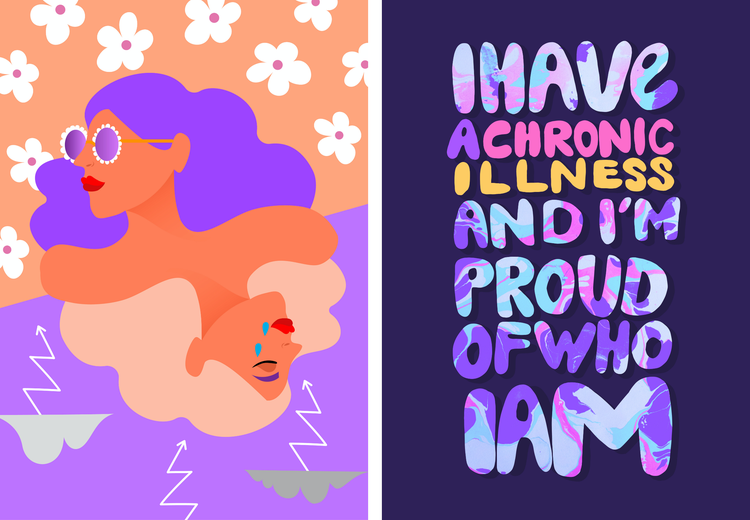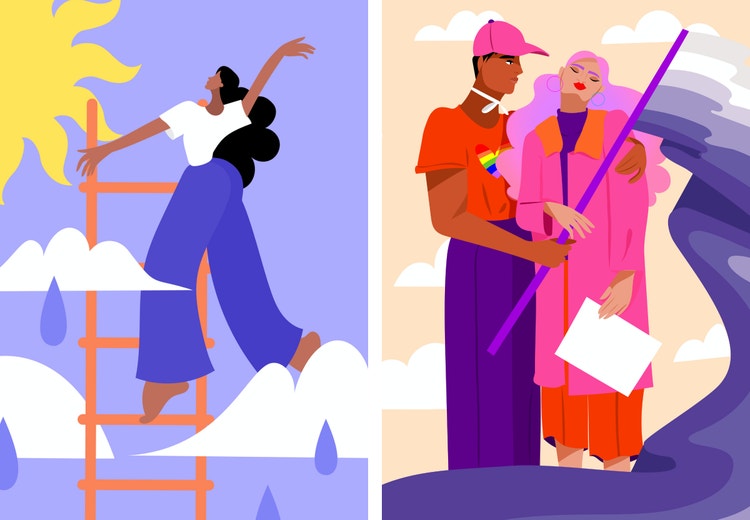Healing as a visual language with illustrator Danii Pollehn

Image credit: Adobe Stock / Danii Pollehn.
When Danii Pollehn originally thought about stepping into a creative career path, illustration wasn’t the first thing on her mind.
“I didn't want to do fairy tales,” says the German artist, an Adobe Stock Contributor and 2021 Artist Development Fund recipient. “And then on the other hand, you have editorial work for political magazines. And I didn't see myself there so much. So that's why it didn't cross my mind.”
Instead, Pollehn pursued training and started working in fashion design. After some time in the industry, she narrowed in on textile design, which she did for a couple years. It turns out that, for Pollehn, digital tools were the key in making the jump from fashion to full-time illustration.
“When I did fashion illustration and textile design, it was almost only working in traditional media,” she says, “Lots of watercolors, some pens and markers, these kinds of things. With getting an iPad, I think that was also when I wanted a career change. I really wanted to illustrate on the iPad, and I got all the Adobe programs on it. And that's when I wanted not only to do patterns, but to create lots of other things.”
These days, Pollehn works almost exclusively in digital. Her eye for fashion is still clear in her imagery, which is full of bright colors and funky clothing. These make for lively and eye-catching visuals, which draw people in and place an emphasis on representing people with differently abled bodies or chronic illness in casual and daily settings.
Turning firsthand experiences of illness and wellness into an insightful stock portfolio
“I feel like people with disabilities and chronic illnesses are quite underrepresented and mostly seen as imperfect and not as full human,” says Pollehn. “I always feel like we’re seen as though we cannot do things as good as others, or we’re not capable, which is not true. I think we can be very bold, vibrant, and beautiful, and that should be more included.”
It’s an issue close to Pollehn’s heart. In her late teens, she began having seizures, and though she would eventually be diagnosed with a brain tumor, it took her many years on medications and in and out of hospitals to get the surgery she needed. In the following six years, Pollehn had several difficulties as she came off her medications, and tried to regain a connection with her own body. Even these days, the artist is still learning how to balance her ambition with her need for self-care.
“I feel like I did not know how to treat myself better,” she says. “Most of the time I kept on pushing even though I knew I was already very exhausted, but I also wanted to function as ‘normal’ people, even though I had brain fog or I wasn't feeling great anymore. I had chronic fatigue moments, feeling very tired, but still like I kept on pushing because I wanted to be accepted. I didn't talk about it much.”
Pollehn has managed to parlay her personal insight into a portfolio that beautifully illuminates living with illness, chronic conditions, or physical limitations, and that also captures different approaches to wellness treatments. For every image that depicts pharmaceuticals, equipment, and other trappings of Western medicine, Pollehn also presents herbal medicine, holistic treatments, and centering practices like yoga.
“I had a brain tumor, so they would not have operated just with herbs,” she says, smiling. “But I think both positions are valid and helpful. I don't think that Western medicine can help with everything, because they're observing you within certain boundaries of what they know. The body is quite interesting, and they might not listen to you or miss some details — there's so much medical gaslighting happening, especially with chronic illnesses.”

Image credits: Adobe Stock / Danii Pollehn — Adobe Stock / Danii Pollehn.
Creating lush botanical images with vibrant color
Though her work for the Artist Development Fund focuses mostly on human subjects, Pollehn also has a love of plants and flowers. They've often been the subject of her work, or they’ve been recurring motifs in her backgrounds. A 2021 series of papercuts evokes a feeling of modern Matisse, with clean forms in bright colors cavorting across lush, tropical backgrounds. Oranges, purples, magentas, and teals feature heavily in Pollehn’s designs, and she demonstrates an expert eye for maintaining balance withing maximalist compositions and palettes.
“I did various projects in the past about plants,” she says, “and apparently in textile design, the best-selling products are flower prints or tropical. So I used to do that a lot as well.”
Pollehn loves to visit botanical gardens and, much like Matisse, enjoys traveling to tropical countries to explore nature that differs from what she’s used to in Europe. Though it’s easy to imagine that her home is a bohemian explosion, Pollehn says she keeps things mostly white, with bursts of color, so as not to overstimulate herself.
“Mainly it's white, because I feel like it's easier for my brain to calm down,” she says. “I can quickly get overwhelmed.”

Image credits (left to right): Adobe Stock/Danii Pollehn — Adobe Stock/Danii Pollehn.
Finding artistic inspiration in her own strength, and helping others raise their voices
Despite all that exciting color, it seems like the place Pollehn finds the most inspiration is within herself. This was especially true when it came to tackling her portfolio for the Artist Development Fund.
“First of all, I tried to check inside of me — what's there that I want to talk about or draw about?” she says. “I reminisced about the times where everything was really bad, and now that I'm feeling a little better, there are sometimes backslides. What's annoying to me? What are my challenges, then? What could other people's challenges be? What would we need to feel better? What would help us? How do we feel in general about what society thinks of us?”
Pollehn also talked to friends with chronic illnesses, such as ADHD or disabilities, to try to find out what they’d need to feel more represented or understood. She thinks the work is important — not just because it brings more options to the table when clients go looking for stock to reflect their audience — but also because it encourages her whole cohort to speak for themselves.
“I really hope I can inspire other disabled or chronic-illness artists to bring their voices to the table, because obviously I cannot talk for all of us,” she says. “And I don't want to and I shouldn't. I just really hope that others feel inspired to also step up for themselves and get out their stories and experiences. We can build the community and be more kind toward each other. I'm hoping to make room for others who also fight every day and have bad experiences. I’m hoping we can all feel understood and represented.”
Explore Danii Pollehn’s portfolio on Adobe Stock, and check out the to learn more about commissioned artists and opportunities to apply for the Artist Development Fund.Adobe Stock Advocates program to learn more about commissioned artists and opportunities to apply for the Artist Development Fund.